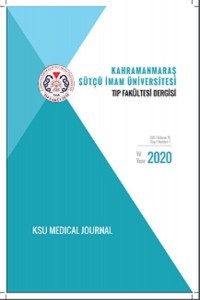Polikistik Over Sendromu ve Uyku Bozuklukları: Uyku Bileşenleri ile Metabolik ve Androjenik Bozukluklar Arasındaki İlişki
Dislipidemi, Pittsburgh Uyku Kalitesi İndeksi, Polikistik over sendromu, Uyku kalitesi
Polycystic Ovary Syndrome and Sleep Disorders: Association Between Metabolic and Androgenic Alterations with Sleep Components
Dyslipidemia, The Pittsburgh Sleep Quality Index, Polycystic ovary syndrome, Sleep quality,
___
- Asuncion M, Calvo RM, San Millan JL, Sancho J, Avila S, Escobar- Morreale HF. A prospective study of the prevalence of the polycystic ovary syndrome in unselected Caucasian women from Spain. J Clin Endocrinol Metab 2000;85:2434–2438.
- Dumesic DA, Oberfield SE, Stener-Victorin E, Marshall JC, Laven JS, Legro RS. Scientific statement on the diagnostic criteria, epidemiology, pathophysiology, and molecular genetics of polycystic ovary syndrome. Endocr Rev 2015;36(5):487–525.
- Wang R, Mol BW. The Rotterdam criteria for polycystic ovary syndrome: evidence-based criteria? Hum Reprod 2017 Feb;32(2):261-264.
- Helvaci N, Karabulut E, Demir AU, Yildiz BO. Polycystic ovary syndrome and the risk of obstructive sleep apnea: a meta-analysis and review of the literature. Endocr Connect. 2017;6:437- 445.
- De Sousa G, Schluter B, Buschatz D, Menke T, Trowitzsch E, Andler W et al. A comparison of polysomnographic variables between obese adolescents with polycystic ovarian syndrome and healthy, normal-weight and obese adolescents. Sleep Breath 2010;14:33-38.
- Legro RS, Arslanian SA, Ehrmann DA, Hoeger KM, Murad MH, Pasquali R et al. Diagnosis and treatment of polycystic ovary syndrome: an endocrine society clinical practice guideline. J Clin Endocrinol Metab 2013;98:4565-4592.
- March WA, Moore VM, Willson KJ, Phillips DI, Norman RJ, Davies MJ. The prevalence of polycystic ovary syndrome in a community sample assessed under contrasting diagnostic criteria. Hum Reprod 2010;25(2):544–551.
- Moran LJ, March WA, Whitrow MJ, Giles LC, Davies MJ, Moore VM. Sleep disturbances in a community-based sample of women with polycystic ovary syn- drome. Hum Reprod 2015;30:466-472.
- Thannickal A, Brutocao C, Alsawas M, Morrow A, Zaiem F, Murad MH et al. Eating, Sleeping and Sexual Function Disorders in Women with Polycystic Ovary Syndrome (PCOS): a systematic review and meta-analysis. Clin Endocrinol (Oxf) 2020 Apr;92(4):338-349
- Simon S, Rahat H, Carreau AM, Garcia-Reyes Y, Halbower A, Pyle L, et al. Poor Sleep is Related to Metabolic Syndrome Severity in Adolescents with PCOS and Obesity. J Clin Endocrinol Metab 2020 Apr 1;105(4): 1827-1834.
- Sam S, Ehrmann DA. Pathogenesis and Consequences of Disordered Sleep in PCOS. Clin Med Insights Reprod Health 2019 Sep 3;13:1179558119871269.
- Tasali E, Van Cauter E, Ehrmann DA. Relationships between sleep disordered breathing and glucose metabolism in polycystic ovary syndrome. J Clin Endocrinol Metab 2006;91:36-42.
- McCartney CR, Marshall JC. Clinical practice. Polycystic ovary syndrome. N Engl J Med 2016;375:54-64.
- Fogel RB, Malhotra A, Pillar G, Pittman SD, Dunaif A, White DP. Increased prevalence of obstructive sleep apnea syndrome in obese women with polycystic ovary syndrome. J Clin Endocrinol Metab 2001;86:1175-1180.
- Vgontzas AN, Legro RS, Bixler EO, Grayev A, Kales A, Chrousos GP. Polycystic ovary syndrome is associated with obstructive sleep apnea and daytime sleepiness: role of insulin resistance. J Clin Endocrinol Metab 2001;86:517-520.
- Yang HP, Kang JH, Su HY, Tzeng CR, Liu WM, Huang SY. Apnea-Hypopnea Index in non obese women with polycystic ovary syndrome. Int J Gynaecol Obstet 2009;105:226-229.
- Buysse DJ, Reynolds CF, Monk TH, Berman SR, Kupfer DJ. The Pittsburgh Sleep Quality Index: a new instrument for psychiatric practice and research. Psychiatry Res 1989;28:193-213.
- Rotterdam ESHRE/ASRM-Sponsored PCOS Consensus Workshop Group Revised 2003 consensus on diagnostic criteria and long-term health risks related to polycystic ovary syndrome. Fertil Steril 2004;81(1):19–25.
- Jellinger PS, Handelsman Y, Rosenblit PD, Bloomgarden ZT, Fonseca VA, Garber AJ et al. American Association of Clinical Endocrinologists and American College of Endocrinology guidelines for management of dyslipidemia and prevention of cardiovascular disease. Endocr Pract. 2017 Apr;23(Suppl 2):1-87.
- Chatterjee B, Suri J, Suri JC, Mittal P, Adhikari T. Impact of sleep-disordered breathing on metabolic alterations in patients with polycystic ovary syndrome. Sleep Med 2014;15:1547-1553.
- Nandalike K, Strauss T, Agarwal C, Coupey SM, Sin S, Rajpathak S, et al. Screening for sleep-disordered breathing and excessive daytime sleepiness in adolescent girls with polycystic ovarian syndrome. J Pediatr 2011;159:591-596.
- Samuel VT, Shulman GI. The pathogenesis of insulin resistance: integrating signaling pathways and substrate flux. J Clin Invest 2016;126(1):12–22.
- Anderson B, Marin P, Lissner L, Vermeulen A, Bjorntorp P. Testosterone concentrations in women and men with NIDDM. Diabetes Care 1994 May;17(5):405-411.
- De Sousa G, Schluter B, Buschatz D, Menke T, Trowitzsch E, Andler W et al. The impact of insulin resistance and hyperandrogenemia on polysomnographic variables in obese adolescents with polycystic ovarian syndrome. Sleep Breath. 2012;16:169- 175.
- Jamilian M , Foroozanfard F, Mirhosseini N , Kavossian E, Aghadavod E , Bahmani F et al. Effects of Melatonin Supplementation on Hormonal, Inflammatory, Genetic, and Oxidative Stress Parameters in Women With Polycystic Ovary Syndrome. Front Endocrinol (Lausanne). 2019 May 14;10:273.
- ISSN: 1303-6610
- Yayın Aralığı: Yılda 3 Sayı
- Başlangıç: 2004
- Yayıncı: Kahramanmaraş Sütçü İmam Üniversitesi
Emine YURDAKUL ERTÜRK, Taner KASAR
6 Ay-18 Yaş Suriyeli Mülteci Çocuklarda Anemi Etiyolojisi
Nurten SERİNGEÇ AKKEÇECİ, Can ACIPAYAM, Ömer DUYURAN
Gebelikte Ödem ve Proteinürinin Çok Nadir Görülen Bir Nedeni: Mirror Sendromu
Abdullah TOK, Fatma Betül GÜZEL, İlyas OZTURK, Ertuğrul ERKEN, Orçun ALTUNÖREN, Özkan GÜNGÖR
Kronik Aort Yetmezliği Olan Hastalarda Hipertansiyon Sıklığı
Oguzhan YÜCEL, Hakan GÜNEŞ, Mehmet Birhan YILMAZ
Tıp Fakültesi Öğrencilerinde ve Aile Hekimlerinde Anemi Bilgi ve Farkındalığının Değerlendirilmesi
Emirhan ÇAKAR, Raziye Şule GÜMÜŞTAKIM, Celal KUŞ
Wolfram (DIDMOAD) Sendromu: Olgu Sunumu
Eda ALTUN, Saime PAYDAS, Bülent KAYA, İbrahim KARAYAYLALI
İdiyopatik Subjektif Tinnituslu Hastaların Trombosit Fonksiyonlarının Değerlendirilmesi
Saime SAĞIROĞLU, Metin KILINÇ, Muhammed Gazi YILDIZ, İrfan KARA, Nagihan BİLAL, İsrafil ORHAN
